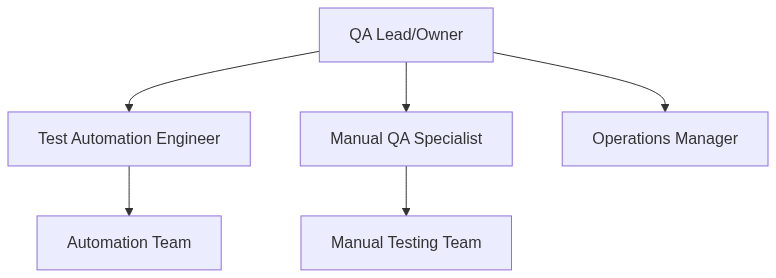Scaling Your QA Business: The Power of Delegation and Strategic Growth
The software testing industry is experiencing unprecedented growth, with the global QA market expected to reach $25 billion by 2026. For many QA professionals operating as solo consultants, this represents an extraordinary opportunity to scale. However, the journey from individual consultant to successful agency requires strategic thinking, effective delegation, and smart resource management.
The Evolution of a QA Business
Traditional Growth Path:
Solo Consultant → Project Overflow → First Hire → Team Formation → Agency
According to industry data, successful QA consultancies typically take 18-24 months to transition from solo operations to a sustainable small team, with the most critical phase being the first three hires.
Common Problems and Strategic Solutions in QA Scaling
| Problem | Traditional Approach | Improved Solution | Impact |
|---|---|---|---|
| Test case overload | Working longer hours | Delegate routine testing | 40% time savings |
| Client communication | Handling all calls | Dedicated account manager | 60% more client engagement |
| Documentation | DIY approach | Technical writer/QA support | 75% faster delivery |
| Test automation | Single engineer setup | Specialized automation team | 3x coverage increase |
Strategic Delegation in QA
First Tasks to Delegate:
- Test execution for routine scenarios
- Test case documentation
- Initial bug reporting
- Client status updates
- Administrative tasks
ROI Analysis for First QA Hire:
- Average QA consultant rate: $150/hour
- Junior QA salary: $25-35/hour
- Time saved per week: 20-25 hours
- Monthly revenue increase potential: $8,000-12,000
Building Your QA Team Structure
Technology Stack for Scaling
Core Testing Infrastructure:
-
Test Management:
- JIRA + Zephyr
- TestRail
- qTest
-
Automation Framework:
- Selenium WebDriver
- Cypress
- Playwright
-
Load Testing:
- GoReplay for production traffic replay
- JMeter for traditional load testing
- K6 for developer-centric performance testing
GoReplay Implementation Strategy:
- Capture production traffic patterns
- Replay for regression testing
- Validate system behavior under real conditions
- Identify performance bottlenecks
- Cost-effective alternative to traditional load testing
Global Team Management in QA
Distributed Team Structure Success Rates:
- Co-located teams: 65% success rate
- Hybrid teams: 72% success rate
- Fully remote teams: 68% success rate (Source: Industry QA Leadership Survey 2023)
Time Zone Management Strategy:
| Region | Overlap Hours | Primary Responsibilities |
|---|---|---|
| US/Europe | 3-4 hours | Client meetings, Planning |
| Asia/Pacific | 4-5 hours | Test execution, Automation |
| Cross-regional | 2-3 hours | Daily handoffs, Reviews |
Communication and Collaboration Tools
Essential Stack:
-
Project Management
- Jira for issue tracking
- Confluence for documentation
- Trello for task management
-
Communication
- Slack for instant messaging
- Zoom for video calls
- Email for formal communications
-
Testing Collaboration
- TestRail for test case management
- GitHub/GitLab for code version control
- GoReplay for sharing traffic recordings across teams
”Are You Ready to Scale?” Checklist
✓ Business Fundamentals
- Consistent client base (minimum 3-4 long-term clients)
- Stable monthly revenue ($15k+ monthly)
- Documented processes and procedures
- Defined service offerings
- Clear pricing structure
✓ Technical Infrastructure
- Automated testing framework in place
- Load testing capabilities (GoReplay implementation)
- Version control system
- CI/CD integration
- Security protocols
✓ Team Readiness
- Training documentation prepared
- Onboarding process documented
- KPIs established
- Communication protocols defined
- Review processes established
Cost Analysis for Scaling
Initial Investment (First 6 Months):
Setup Costs:
- Infrastructure: $5,000-8,000
- Tools and Licenses: $3,000-5,000
- Training: $2,000-4,000
Monthly Operating Costs:
- Junior QA: $4,000-6,000
- Tools/Software: $500-1,000
- Management Time: $2,000-3,000
Expected Return:
- Break-even point: 4-6 months
- First-year profit increase: 25-40%
- Client capacity increase: 50-75%
Common Pitfalls and Solutions
-
Over-delegation
- Problem: Losing quality control
- Solution: Implement tiered review system
- Tool: Use GoReplay for validation
-
Under-delegation
- Problem: Bottlenecked growth
- Solution: Start with 20% delegation, increase gradually
- Metric: Track hours saved weekly
-
Poor Communication
- Problem: Misaligned expectations
- Solution: Daily standups, weekly reviews
- Tool: Standardized reporting templates
Future-Proofing Your QA Agency
Industry Trends to Watch:
- AI in testing (45% adoption rate)
- Shift-left testing (65% implementation)
- Performance testing automation (38% growth)
- Security testing integration (52% increase)
Strategic Positioning:
- Develop specialty niches
- Build intellectual property
- Create recurring revenue streams
- Establish strategic partnerships
Measuring Success
Key Performance Indicators:
- Team utilization rate (target: 75-85%)
- Client satisfaction score (target: >85%)
- Project delivery time (target: 10% improvement quarterly)
- Defect escape rate (target: <5%)
- Revenue per employee (target: $150k+ annually)
Conclusion
Scaling a QA business requires a delicate balance of technical expertise, business acumen, and people management skills. Success comes from methodical implementation of delegation strategies, supported by the right tools and processes. By following this comprehensive guide and utilizing modern tools like GoReplay for efficient testing, QA consultancies can transform from solo operations into thriving agencies.
Remember: scaling is not just about growing bigger – it’s about growing smarter. Focus on building sustainable processes, investing in the right tools, and developing your team’s capabilities. With proper planning and execution, your QA business can achieve sustainable growth while maintaining the quality that got you started.

